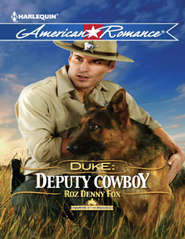По всем вопросам обращайтесь на: info@litportal.ru
(©) 2003-2024.
✖
A Secret To Tell You
Автор
Год написания книги
2018
Настройки чтения
Размер шрифта
Высота строк
Поля
True to her word, April collected the letters from Robyn, who said, “I got your frantic message. What’s the big mystery, April? Why are Eric Lathrop and his boss so interested in those letters? By the way, did I tell you I’m redecorating his boss’s home? Even his witless wife brought up the letters. She pumped me about how well I knew you and asked whether I thought you’d give Eric or her husband the information they want. What information?”
April opened her briefcase and dropped the letters on top of the brick mason’s bid. “Robyn, in about half an hour, it’s going to be a moot point. I’m on my way to Mrs. Santini’s place now to give her back her letters.” She groaned. “Considering how much trouble they’ve been, I wish I’d never found them.” Briefly, April filled her friend in on Eric’s latest attempt to get the letters.
“So I take it you’re not going to Quinn Santini’s fund-raising ball with Eric? He apparently told his boss you were.”
“My brother gave him some tickets. But no, I won’t be attending anything with Eric. He’s toast as far as I’m concerned.”
“Good. You can do better. But I hoped we could go shopping for dresses. I feel a shopping attack hovering,” Robyn said with a wink as April prepared to leave her shop.
“I’ll tag along. I love watching you shell out money, Robyn.” They arranged an afternoon to meet for lunch and shopping.
There were two men working on the Santini front gate when April tried to turn into the drive. “Norma Santini’s expecting me,” she said after rolling down her window.
The workmen weren’t very trusting. One phoned the house and received an okay before letting April pass.
Norma met her at the door. “You came! All day I’ve worried that you’d change your mind.”
April extracted the bundle and placed it in Norma’s outstretched hands. “You’re welcome to these. My advice—burn them.”
The older woman clasped the letters as if they were precious jewels. “Won’t you come in?” she said. “I’d love to have you stay for dinner, my dear.”
“Thank you, but I can’t. I have just about enough daylight left to dig holes for my light poles. The mason said if I get them set, he’ll work in bricking around them next week.” She tripped lightly down the steps and waved as she got into her pickup.
Driving out the gate where the men were still working, she passed Quinn Santini’s Lexus. “Phew, that was a close call.” In the rearview mirror, she watched him turn through the gate. April felt a surge of relief at declining Norma’s dinner invitation.
Back at the house, Norma settled in her favorite chair to begin reading her precious letters for the first time in almost sixty years. She’d reached the end of the first letter when her front door flew open and her grandson burst inside. Sniffling, Norma fumbled for a tissue and attempted to hide the letters in the folds of her skirt.
“Gram, tell me what that Trent woman said to upset you. I passed her headed out. My gut said I should stop her—that she was up to no good.” Quinn jerked up the white phone that matched the room’s decor. “This time I will press charges. It was those damned letters, wasn’t it? Did she come to shake you down for more money? I won’t allow her to barge in here and make you cry.”
“Quinn, hush. She brought me the letters and wouldn’t take a cent. Please, calm down and sit with me. Joseph and Ethel have taken Hayley to her gymnastics class, so you and I have time to talk.”
“About what? Those letters?” He saw them now and eyed her with a scowl.
“In a way.” Her fingers plucked idly at the faded red ribbon. “I have a secret to tell you, Quinn. One that’s burdened my heart for much too long.”
Chapter 4
“A secret? That sounds ominous, Gram.” Quinn slumped down on the chintz love seat and draped one arm over the padded armrest, his eyes still on his grandmother.
“I wouldn’t say ominous, exactly.” All the same Norma shuffled the letters nervously. “Your grandfather extracted a promise from me that we’d carry this secret to our graves. He did. But since these letters went missing, a lot has changed. There are things you don’t know that you should.”
Quinn sat forward and clasped his hands between his knees. “You’d better tell me, then. Especially if there’s stuff that could turn up in the campaign…”
Her eyes shifted to the envelopes fluttering in her hands. Without fanfare, Norma dove into her story at the same point where she’d begun reminiscing at April’s. Reaching the spot she’d halted before, Norma hesitated only a few seconds before plunging on. “I never viewed anything I did overseas as a lark, Quinn, even though a significant part of our jobs involved mingling with the patrons at popular night spots. We were expected to keep our ears open and pick up what we could in the way of usable information. By usable I mean anything with the potential to help our fighting forces. Whatever we gathered was coded the next morning and sent via teletype or by hand delivery to male agents in the field. Messages came back the same way. Often we were asked to see a particular man again, usually an officer. Or we were dispatched to dig up more information somewhere else.”
“I can’t believe it—yesterday I was joking you’d been a spy, like Dietrich and Child,” Quinn stammered. “And now I find out you were.”
“I’m sure it sounds preposterous.” Norma paused when he got up suddenly and poured them each a bracing shot of brandy. He swirled it in the two snifters, then handed her one. She took a sip, letting him return to his seat before she went on.
“One day there was a change in my routine that disrupted the entire focus of my mission. Tony, your grandfather, whom I knew only as Kestrel, a man I hadn’t laid eyes on since my training days, awakened me in my apartment late one night. With him was a four-star general whose name I recognized and actually recalled seeing at one of my father’s weekend gatherings. Kestrel and the general gave me official orders to travel by train from Marseilles to the town of Colmar, near the German border. My task—cozy up to a German officer who’d flirted with me twice at a local café. I had, of course, reported those encounters and our conversations. My first reaction was that I must be dreaming, but no, I wasn’t, and those two were quite serious. They wanted me to…seduce military secrets out of an enemy.”
Norma heard Quinn choke on his brandy. Her head shot up and she backtracked a bit. “Understand, Quinn, that I was young and reasonably attractive. And the officer they’d singled out was very handsome and charming. So I didn’t consider this a hardship. Nor was their request out of the ordinary. I knew female agents who’d been asked to do more.”
“But…you must’ve known how dangerous it was to openly spy on an enemy.”
She brushed his comment aside. “At the time, Quinn, every third person in France was spying for one country or another. My cover was that of a clerk working for an American-owned shipping company in Marseilles. Our business was legitimate, but like so many others, it served as a front for gathering intelligence, which we passed to field agents, who in turn got the information into Allied hands. We were told daily that what we did saved lives. So, except for being handed back my passport which I needed to travel to and from Colmar, my new orders weren’t much different from what I’d been doing in Marseilles. And Heinz von Weisenbach, the young officer I was to shadow, had never frightened me like many of his comrades did.”
Norma wasn’t aware that the tenor of her voice changed and her features softened as she spoke about Heinz. “He was witty, cultured and soft-spoken.” But Quinn noticed. He glanced sharply at this woman he no longer knew, and felt himself tense at what was to come.
“I had no trouble establishing contact with Heinz in Colmar. He was delighted to see me. I shouldn’t have been surprised that there were more men in German uniforms, since we were near the border, but I was nervous and he could tell. I’ve never doubted that we both entered the relationship for the purpose of obtaining secrets from each other. What I didn’t expect was that Heinz would denounce the war so sincerely. But he did. Around me, he revealed himself as a man who enjoyed sitting quietly, listening to Bach, Beethoven and other classical composers. I soon learned he’d attended way more concerts than I ever had. We fell into the habit of taking long walks together. Once he asked a total stranger on the street to take a picture of us. Every day, he brought me a rose from some bushes that grew in pots along the balcony where he lived. I’d never seen his quarters. Couples were more circumspect in my day—at least at the beginning of a courtship.”
“You had a courtship with a German when we were at war with them?” Quinn appeared thunderstruck.
Sitting up straight, Norma said sternly, “Love doesn’t differentiate between uniforms.”
“Love? You fell in love? With an enemy?”
She bit her lip hard for a minute, then her voice dropped, sounding slightly ragged. “Yes, or so I thought.” She blinked back tears. “I was a willing participant the night Heinz seduced me with roses, wine and music. It was a momentous experience for me, Quinn. Other female agents had been ordered to submit for the purpose of gathering information through pillow talk, but that wasn’t what I’d been charged to do. In fact, Kestrel, er, Anthony, had been quite adamant at the outset of my mission that it did not include me going to bed with the colonel.”
“Colonel. Oh, great. Now I suppose you’ll tell me he was Hitler’s fair-haired boy.” Vaulting off the love seat, Quinn strode to the fireplace. The fire had burned down and he threw on two logs, stabbing at them with the poker. When flames shot up, he jammed the poker back in place, with the rest of the tools on the hearth. He stood, keeping his back to his grandmother, hands braced on the mantel. “I think I’ve heard enough,” he said. “If those so-called love letters are from him, burn them all.” Quinn clenched his back teeth.
Norma didn’t move, but her voice grew steely. “Hiding them won’t alter the facts, Quinn. Nor will turning them into ashes.”
He glanced at her over his shoulder, his eyes a cold blue and his face a harsh mask. “Finish your story, then. We’ll put your guilt to rest and then forget this ever came up.”
“I can’t forget,” Norma said simply. “That night with Heinz was my first. It was terrifying, but also beautiful. Heinz swore he’d grown to love me with all his heart. He promised he’d find a way for us to be together openly. I believed him. I had no reason not to. Especially since he sent the first of these letters the very next day.” Norma picked up the top one.
“Could you cut to the chase? I don’t want to hear the details.”
“All right. You want it straight, Quinn, here it is. Within days, things on the front heated up and I received notice to return to Marseilles. I sent Heinz a note requesting what I feared would be our last clandestine meeting. To my astonishment and extreme joy, he begged me to help him defect.”
“What?”
She smiled at Quinn’s yelp. “Yes. I knew it was so we could be together always. But it was more than that. Many times he’d confided to me that he was worried about the decisions Hitler was making. Not surprising, as there were whispers about the atrocities taking place. Defecting wasn’t as uncommon as you might think,” she said.
Quinn continued to gape. “Well, that puts a more positive spin on this tale than I expected. So what happened? Did you help him? You obviously weren’t together always.”
“Are you always so impatient? I’m reconstructing what happened long ago. You’ll have to bear with me and let me explain at my own pace.”
“Okay. More brandy? If you don’t mind, I’m going to freshen my drink.”
Norma shook her head. “There’s still a lot left to tell, Quinn.” He heard her take a deep breath. “I mistakenly assumed it would be merely a matter of notifying my contact. Kestrel, uh, Tony. I thought safe passage to America would be arranged for Heinz overnight.”
Quinn tipped three fingers of brandy into his snifter and recapped the bottle. “I can’t believe you worked for the government and had such unrealistic expectations,” he said wryly. “Nothing happens in government overnight.”
Her shoulders relaxed a bit. “Did I mention that I was naive? Well, I was. I sent my report, but heard nothing. Days passed, and I had two messages requesting I return to Marseilles. I started to panic, thinking my note had gone astray. Despite the danger that it might fall into the wrong hands, I sent another. Like you, Heinz understood such requests took time. He was fully prepared to continue a long-distance relationship.” She held up the packet of letters.
“For a month we corresponded secretly and I hid his letters in the lining of my travel satchel, even though they were just the silly things lovers would write—not one sentence of political import. But all at once, again in the middle of the night, two agents I’d never seen in my life—one American, one French—appeared by my bed. I was ordered to pack everything, and I had no idea why. We left by car. For hours I was grilled. I was expected to divulge every intimate detail of my relationship with Heinz.”











